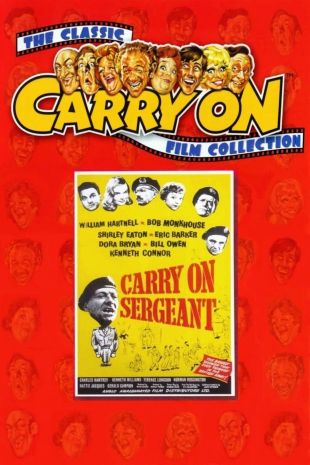
Gerald Thomas's Carry On Sergeant was shot and released, ironically enough, in the very year that John E. Blakeley died -- Blakeley, a movie producer from Lancashire whose career in pictures went back to the 1930's, had specialized in movies built around music hall humor and music hall comedians, aimed specifically at northern British audiences; the most fondly remembered of his pictures were his wartime service comedies, including Somewhere In England, Somewhere In Camp, and Somewhere On Leave, which achieved slightly wider popularity in England. Carry On Sergeant was essentially a successor to those movies, with higher production values and better actors working around the comedic personalities -- it was a hit with middle-class British audiences and even saw release in America. Their first time out with this kind of vehicle, Thomas and producers Peter Rogers, Nat Cohen, and Stuart Levy felt that putting established dramatic actor William Hartnell -- enjoying stardom in a series of military roles at the time -- in among the comic performers was the best way to go, but once the series got rolling they realized that the more funny men (and women) the better, and the slapstick humor became the "Carry On" movies' focus and raison d'etre. In this instance, Hartnell, along with Shirley Eaton -- six years from emerging internationally as a "Bond girl" in Goldfinger -- as the eager wife of a National Serviceman called up on his wedding day, fit nicely in between the comic hijinks and sight gags, and Hartnell, in particular, lends Carry On Sergeant a touch of class that most of the later entries in the series not only didn't have but consciously avoided. Otherwise, the gags, apart from a few double-entendre jokes that are mostly comprehensible to British audiences, are among the oldest and most reliable in the field of comedy, going back well past, say, the Abbott & Costello comedy Buck Privates, probably to at least the middle of the nineteenth century in many cases -- and they're still funny, and nothing more so than the scene of gangly Charles Hawtrey getting his beyonet jammed in the practice dummy.
